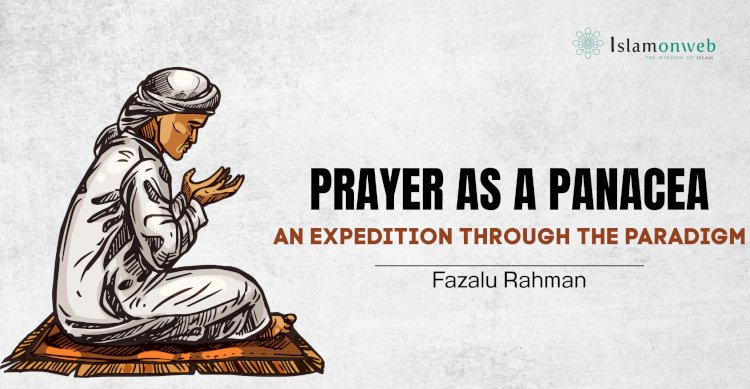PRAYER AS A PANACEA: AN EXPEDITION THROUGH THE PARADIGM
Human beings are the creation of the Almighty. Islam distinguishes the mu’min (believer) from others through a distinct way of life grounded in firm belief. Human life is filled with twists and turns, and adversities are part of our daily experience. A mu’min beset with trials and hardships is not left without means to overcome them. Delay in recognising and holding onto these means can endanger one’s journey from this fleeting world to the eternal abode.
What is most needed is a fervent and unwavering belief in Allah. Only then can one remain steadfast in this temporary and material world. A mu’min becomes a true servant of Allah when he fulfils his duties – foremost among them are unwavering dedication to prayer (ṣalāh) and humility in acknowledging that we are all slaves of the Creator of the universe.
Scientific studies on prayer point to its benefits as a remedy for many ailments, including stress, depression, and other health-related issues. From a practical perspective, ṣalāh (namāz) is not merely the recitation of Qur’ān; it is also a physical act involving specific movements – standing, bowing, prostrating, and sitting – each contributing to physical well-being. But more importantly, prayer is the believer’s spiritual anchor.
How does it serve as a solution? Most problems arise when patience and resilience are absent. Prayer provides the believer with support, reminding them that they are never alone. It strengthens the soul, whispering reassurance into the heart and enabling him to endure trials. The rise and fall of worldly difficulties are tied to one’s faith, for faith connects a person with the One who stands with him in every moment.
Prayers also instil the fundamental principles needed to live a balanced life, shaping not only the individual but also the society. Among these principles is discipline. Through regular observance, ṣalāh fosters both physical well-being and social order, ensuring that a community grows in harmony. Thus, prayer can rightly be seen as a solution for all aspects of life, affirmed by both religion and science.
Allah says in the Qur’ān:
إِنَّ الصَّلَاةَ كَانَتْ عَلَى الْمُؤْمِنِينَ كِتَابًا مَّوْقُوتًا
“Inna aṣ-ṣalāta kānat ʿala al-muʾminīna kitāban mawqūtā”
“Indeed, prayer has been decreed upon the believers a decree of specified times.” (Qur’ān 4:103)
This verse emphasises that ṣalāh is an obligatory act bound to fixed times, teaching mindfulness and discipline in daily life. The Qur’ān repeatedly links prayer with the cultivation of order and discipline, which are essential to shaping a righteous life.
Allah also says:
أَقِمِ الصَّلَاةَ لِدُلُوكِ الشَّمْسِ إِلَىٰ غَسَقِ اللَّيْلِ
“Aqimi aṣ-ṣalāta li-dulūki ash-shamsi ilā ghasaqi al-layl”
“Establish the prayer at the decline of the sun (from its meridian) until the darkness of the night.” (Qur’ān 17:78)
This verse clearly establishes the five daily prayers as a framework of discipline, anchoring the believer’s routine in consistency and regularity.
Every argument the Qur’ān presents about the qualities of prayer has later found affirmation in scientific studies as well. One of the most profound outcomes of ṣalāh is the tranquillity it instils in the hearts of believers by strengthening their connection with Allah.
Some claim that this sense of tranquillity is present in other religions too. For instance, Andrew Newberg, in his book How God Changes Your Brain: An Introduction to Jewish Neurotheology, argues that spirituality across religions can bring peace of mind. However, the uniqueness of Islamic prayer lies in its depth of devotion and structured discipline, rather than vague or abstract stillness.
The Qur’ān affirms:
أَلَا بِذِكْرِ اللَّهِ تَطْمَئِنُّ الْقُلُوبُ
“Alā bidhikri Allāhi taṭmaʾinnu al-qulūb”
“Indeed, in the remembrance of Allah do hearts find peace.” (Qur’ān 13:28)
This verse makes it clear that true serenity comes from the remembrance of Allah, and ṣalāh is the foremost means of attaining it.
Stress, one of the most common ailments of modern life caused by daily struggles and hardships, is greatly alleviated through prayer. The Prophet ﷺ said:
«حُبِّبَ إِلَيَّ مِنْ دُنْيَاكُمُ النِّسَاءُ وَالطِّيبُ، وَجُعِلَتْ قُرَّةُ عَيْنِي فِي الصَّلَاةِ»
“Ḥubbiba ilayya min dunyākumu an-nisāʾu waṭ-ṭīb, wa juʿilat qurratu ʿaynī fī aṣ-ṣalāh.”
“I have been made to love from your worldly life women and perfume, but the coolness of my eyes has been placed in prayer.” (al-Nasāʾī, Aḥmad)
This noble saying highlights that the Prophet ﷺ found his deepest comfort, relief, and joy in prayer, showing believers that ṣalāh is the ultimate refuge from the burdens of life.
Supporting this perspective, Marc Applebaum, in his article “Dhikr as Mindfulness: Meditative Remembrance in Sufism,” notes that many in Western societies seek stress reduction through dhikr, a form of Islamic remembrance. This demonstrates that dhikr serves as a means to reduce stress and refresh the mind.
Prayer also impacts the body. Hazem Doufesh, in his study “EEG Spectral Analysis on Muslim Prayers,” highlights the relaxation achieved through Islamic prayer, further supporting the argument that ṣalāh provides both mental and physical tranquillity.
There is also a well-known ḥadīth:
«كَانَ رَسُولُ اللَّهِ ﷺ إِذَا حَزَبَهُ أَمْرٌ صَلَّى»
“Kāna Rasūlu Allāhi ﷺ idhā ḥazabahu amrun ṣallā.”
“Whenever the Messenger of Allah ﷺ was troubled by a matter, he would pray.” (Abū Dāwūd, Aḥmad)
This ḥadīth affirms that the Prophet ﷺ himself turned to prayer as a source of relief and ease.
Further, Vahid Sobhani’s study “Islamic Praying Changes Stress-Related Hormones and Genes” conducted on 83 healthy men and women, illustrates how ṣalāh significantly contributes to mental and physical well-being. It also supports the smooth functioning of internal organs. Similarly, Yeganeh Shaverdi’s study “The Effect of Islamic Praying on Heart Rate Variation in Adult Muslims” concludes that prayer improves cardiovascular performance and reduces stress.
All these findings make it clear that prayer is not a mere ritual; it is a profound remedy addressing the mind, body, and soul – a true solution to the challenges we face today.
From all this evidence, it becomes clear that prayer has a profound impact on the believer. Bayu Suseno, in his study “Muslim Prayer and Its Restorative Effect,” identifies two dimensions of prayer’s influence. Stress, he explains, is related both to emotional and mental states — visible psychologically through relaxation and focus — and physiologically through its effect on the central nervous system (CNS), autonomic nervous system (ANS), sympathetic nervous system (SNS), and parasympathetic nervous system. This demonstrates that prayer produces both psychological and physiological benefits, positively affecting the stability of the mind and the health of the body.
If we bring together the Qur’ānic verses and the scientific findings mentioned earlier, the conclusion is clear: prayer strengthens the spiritual connection with Allah, brings calm to the mind, reduces anxiety, and equips the believer to manage stress. The essence of prayer lies in the conviction that one is never alone. This awareness dispels loneliness by connecting the individual with a larger community of believers and, most importantly, with Allah.
Regular ṣalāh nurtures resilience, enabling the believer to face hardships with patience and hope. It weaves together faith and stress reduction, helping one to overcome trials while finding relief in the assurance that Allah listens to our fears and supplications, and that He provides a way out of difficulties. Prayer also brings peace to a heart burdened by adversity, motivating the believer to persevere and pursue the ultimate purpose of life.
In contrast, dismissing prayer as unnecessary reflects recklessness. What is required instead is firm conviction that prayer is indispensable — not only for spiritual life but also as a remedy for stress, psychological issues, social problems, and worldly hardships. Religious teachings have already been affirmed by scientific research, as shown above. Prayer must therefore be embraced as a consistent practice and a cure for the challenges of humanity. It guides a person to reflect on their deeds, to discern right from wrong, and to reorient their life towards truth.
Thus, prayer is not merely a ritual but the essential key to a positive and purposeful life.
About the author:
Fazalu Rahman is a research student in the Department of Arabic Language and Literature at Darul Huda Islamic University. Hailing from Vaduthala in Alappuzha, he has a keen interest in exploring Islamic texts and literature. His academic pursuits are driven by a commitment to deepening his knowledge and contributing meaningful insights to the field.
REFERENCES:
- Hazem Doufesh, Tariq Faisal, Kheng Seang Lim, Fathima Ibrahim (2011). EEG Spectral Analysis on Muslim Prayers. Applied Psychophysiology & Biofeedback, 37(1), 11–18.
- Vahid Sobhani, Ehsan Manshadi Mokari, Jafar Aghajani, Boshra Hatef (2022). Islamic Praying Changes Stress-Related Hormones and Genes. Journal of Medicine and Life, 15(4), 483–488.
- Yaganeh Shaverdi, Gila Dirzad Jahromi, Gholam Hussein Meftahi, Muhammad Shahab Sharif, Narges Mojabi, Boshra Hatef (2024). The Effect of Islamic Praying on Heart Rate Variation in Adult Muslims. Journal of Modern Rehabilitation, 18(2), Article 15974.
- Bayu Suseno (2023). Muslim Prayer (Salah) and Its Restorative Effect: Psychophysiological Explanation. Asian Journal of Islamic Psychology, 1(1), Article 3702.
- Andrew Newberg (2018). How God Changes Your Brain: An Introduction to Jewish Neurotheology. The Reform Jewish Quarterly.
Disclaimer
The views expressed in this article are the author’s own and do not necessarily mirror Islamonweb’s editorial stance.























Leave A Comment